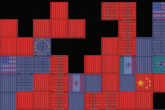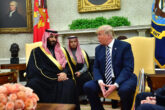
March 23, 2021
Maximizing the Effectiveness of GloMag Sanctions
Testimony Before the Tom Lantos Human Rights Commission
Submitted Written Testimony
I. Strategic Assessment
Co-Chairs McGovern and Smith and distinguished members of the Tom Lantos Human Rights Commission, thank you for the opportunity to testify today on the role of sanctions as a foreign policy tool, and how they can be most effective in the context of the Global Magnitsky Human Rights Accountability Act (“GloMag”).
I’m honored to have the opportunity to speak today on this very important topic, and humbled to be part of this illustrious group testifying today. I applaud Congress’s work to create this important legislation that provides the U.S. government with a flexible option to use when going after those involved in human rights abuses and corruption, and one that I believe has been a valuable addition to the sanctions toolkit.
Given the likelihood of the continued use of this powerful tool in the months and years ahead, my testimony focuses on how best to maximize its impact. This includes five steps: First, sanctions must be part of a broader, clearly defined strategy that takes into account the foreign policy objectives the U.S. government wishes to achieve; second, once this strategy is developed policymakers must decide which tools can best achieve its goals. Choosing the right tools requires a sober analysis of the benefits and limitations of the use of sanctions, and how their impact can be leveraged by other tools of economic statecraft, diplomacy, foreign aid, and, for Global Magnitsky, existing human rights and corruption-focused initiatives; third, once this framework is established it is important to decide on which targets to actually sanction. This requires robust coordination across the government, and, for Global Magnitsky in particular, should also include input from relevant stakeholders in civil society; fourth, sanctions must constantly be evaluated against the stated foreign policy objectives. This should include regular impact assessments, as well as after-action reports once sanctions have been lifted; and fifth, sanctions are best when done multilaterally, and therefore this process should prioritize outreach to, and coordination with, allies throughout.
Download the full testimony.
More from CNAS
-
Game Over?
The trade wargame suggests that sustained high tariffs could create leverage and urgency to spur action toward a productive restructuring of the international trade system....
By Emily Kilcrease & Geoffrey Gertz
-
Middle East Security / Energy, Economics & Security
Trump Inks $600 Bn Deal In Saudi Arabia | Musk, Blackrock CEO Flank Trump In Gulf VisitIn today's episode of India Global, U.S. President Donald Trump secured a $600 billion commitment from Saudi Arabia on Tuesday to invest in the United States. NDTV's Gaurie Dw...
By Daniel Silverberg
-
Energy, Economics & Security / Technology & National Security
Tariffs and Tech: An Uncertain RecipeHigher tariffs could prompt American cloud companies to shift more of their capital investments abroad....
By Pablo Chavez
-
Trump Tariffs: How Will U.S. Plans Reshape the Global Economy?
Donald Trump says he's already decided the tariffs he will impose on countries that export goods to America, including the United Kingdom. Channel 4 hears from Emily Kilcrease...
By Emily Kilcrease




